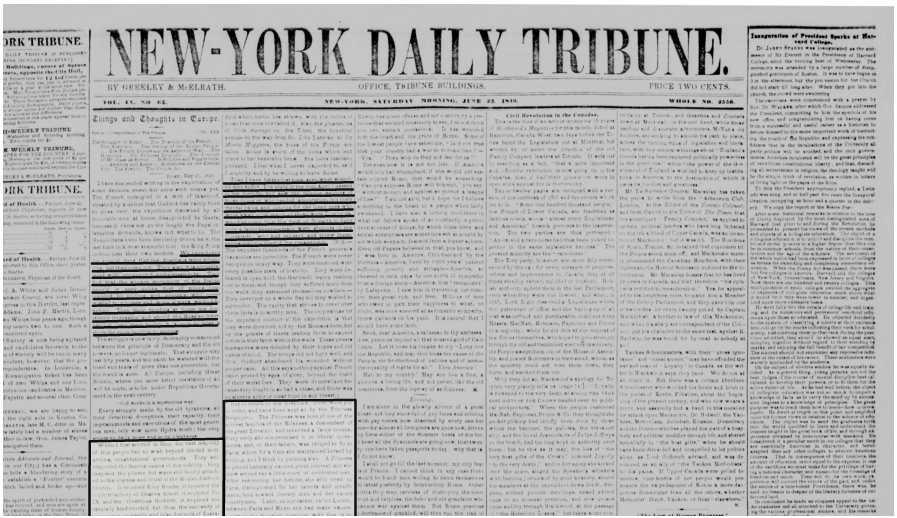
On July 11, 2024, at the 2024 Thoreau Society Annual Gathering, MFS Past President Phyllis Cole was awarded the Thoreau Society Medal, the society’s highest honor. MFS Second Vice President Christina Katopodis read a statement honoring Dr. Cole:
The Thoreau Society confers its highest honor, the Thoreau Society Medal, in recognition of “sustained, essential contributions to the legacy and vitality of Thoreauvian studies and ideals through extraordinary scholarship or service.” This year, we are delighted to extend this award to Dr. Phyllis Blum Cole.
Dr. Cole has had a distinguished career as a ground-breaking researcher, writer, editor, organizational leader, and professor. Her book, Mary Moody Emerson and the Origins of Transcendentalism: A Family History altered the landscape of Transcendentalism. In Bob Gross’s words, it is “a triumph of archival investigation” that “altered scholarship in several fields at once – Transcendentalism, New England’s religious and intellectual history, and women’s history.” Her discoveries in the archives reading Mary Moody’s “Almanacks” resulted in a book providing graceful translation of those works for a public audience and restored “Mary Moody Emerson “to the canon of the early republic.” Dr. Cole’s expert scholarship on women has shown us that, “In many ways Transcendentalism was a women’s world, both in the Thoreau household and in Concord and Boston” (Gross).
In awarding the Thoreau Society Medal to Dr. Cole, we celebrate not only the gifts she has brought us through her research and writing but also her trail-blazing leadership as a woman in academia. Her editorship, mentorship, and colleagueship—for example, her co-edited collection (with Jana Argersinger) Toward a Female Genealogy of Transcendentalism—has attracted the attention of early career women and gender nonconforming scholars, ringing a bell to announce that scholarship by women, and for women, and about women—including queer, trans, and nonbinary women—is not only welcomed but also essential to understanding Transcendentalism. Without Dr. Cole, I would not have seen a place for me here. It wasn’t until attending one of her panels at MLA in 2018, that I felt I had found my people, the people who make an academic life joyful and worth the struggle. Dr. Cole has served as President of the Ralph Waldo Emerson and Margaret Fuller Societies, as well as on the Board of Directors of the Thoreau Society, where she helped organize Annual Gatherings and guide the Society’s collections and fellowship awards. She has contributed to modernizing these important institutions through which we gather, learn, and commune.
It is impossible to convey all the ways in which Dr. Cole is deserving of recognition and the many scholars and writers she has influenced, so I mention just a few. (And I’ve collected pages and pages more from your colleagues and friends who share a glittering of admiration, love, gratitude, and congratulations, that I will share with you after the gathering.) Megan Marshall writes of Phyllis’s [quote] “extraordinary skill and brilliance as a writer of scholarly prose . . . incomparable in her ability to write with both urgency and insight.” Noelle Baker emphasizes Dr. Cole’s influence as [quote] “a role model, a kind mentor and fierce advocate, a cherished friend, and invaluable colleague,” noting that her scholarship is [quote] “foundational to new feminist directions in several fields, including but not limited to transcendentalist studies, Emerson studies (now also populated by women, in large part inspired by her work), Margaret Fuller studies, Thoreau studies, and woman’s suffrage studies.” Finally, Jana Argersinger captures Dr. Cole’s openheartedness when she says, [quote] “Generosity is, for me, the shining through line in Phyllis’s way of walking through the world–generosity of heart and intellect for anyone who crosses her path.”
Dr. Cole, we thank you for your trail-blazing research and leadership, and your profound ability to build communities and connections that will sustain us for generations. You are both a pillar and a dear friend to the Thoreau Society, and we are honored to share this award with you.

Following the award ceremony, MFS members gathered for dinner at Fiorella’s Cucina held in honor of Dr. Cole.






